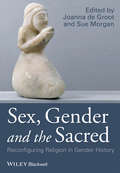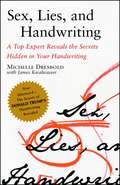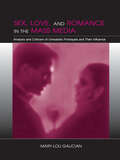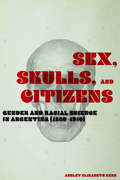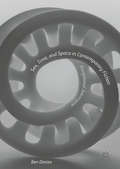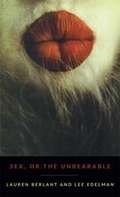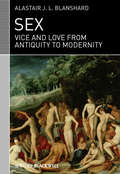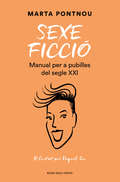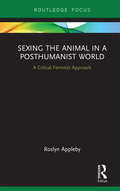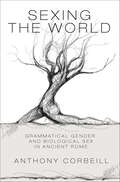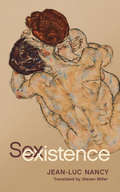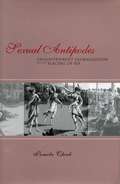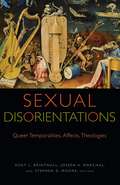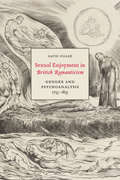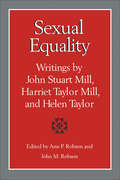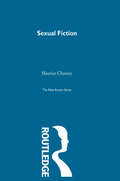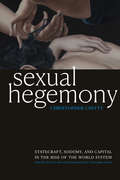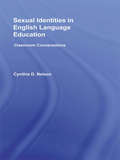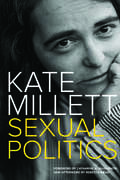- Table View
- List View
Sex, Gender and the Sacred: Reconfiguring Religion in Gender History (Gender and History Special Issues)
by Joanna De Groot Sue MorganSex, Gender and the Sacred presents a multi-faith, multi-disciplinary collection of essays that explore the interlocking narratives of religion and gender encompassing 4,000 years of history. Contains readings relating to sex and religion that encompass 4,000 years of gender history Features new research in religion and gender across diverse cultures, periods, and religious traditions Presents multi-faith and multi-disciplinary perspectives with significant comparative potential Offers original theories and concepts relating to gender, religion, and sexuality Includes innovative interpretations of the connections between visual, verbal, and material aspects of particular religious traditions
Sex, Lies, and Handwriting: A Top Expert Reveals the Secrets Hidden in Your Handwriting
by Michelle Dresbold James KwalwasserHave you ever looked at someone and thought: He looks honest. She seems friendly. He doesn't look like a serial killer. Are you always right? Looks can be deceiving, but handwriting never lies. Handwriting profiling is an amazingly accurate tool for assessing how people think, feel, and act. In fact, handwriting profiling is so accurate that the FBI, the CIA, and the Israeli intelligence agency Mossad use it to build detailed psychological profiles of some of the world's most dangerous individuals. And thousands of major corporations use handwriting profiling to help them make the right hiring decisions. Handwriting expert Michelle Dresbold -- the only civilian to be invited to the United States Secret Service's Advanced Document Examination training program -- draws on her extensive experience helping law enforcement agencies around the country on cases involving kidnapping, arson, forgery, murder, embezzlement, and stalking to take us inside the mysterious world of crossed t's and dotted i's. In Sex, Lies, and Handwriting, Dresbold explains how a single sentence can provide insight into a person's background, psychology, and behavior. Throughout the book, Dresbold explores the handwriting of sly politicians, convicted criminals, notorious killers, suspected cheats, and ordinary people who've written to Dresbold's "The Handwriting Doctor" column for help. She shows you how to identify the signs of a dirty rotten scoundrel and a lying, cheating, backstabbing lover. And she introduces you to some of the most dangerous traits in handwriting, including weapon-shaped letters, "shark's teeth," "club strokes," and "felon's claws." (When you see these traits in someone's script, she says, "it's time to stop reading and start running!") Dresbold also explains how criminals are tracked through handwritten clues and what spouses, friends, or employees might be hiding in their script. Finally, Dresbold re-examines the handwriting evidence in several notorious unsolved cases. She uncovers fascinating clues that reveal the secret side of Lizzie Borden, acquitted of the ax murder of her parents in 1893's "trial of the century." Dresbold also reveals astonishing details about the author of the JonBenÉt Ramsey ransom note, and she presents startling new evidence that exposes the real Jack the Ripper (contrary to popular theories, he wasn't a prince or a painter after all). Sex, Lies, and Handwriting will have you paying a bit more attention to your -- and everyone else's -- penmanship.
Sex, Love, and Romance in the Mass Media: Analysis and Criticism of Unrealistic Portrayals and Their Influence (Routledge Communication Series)
by Mary-Lou GalicianThis accessible yet research-based text offers both foundational theories and practical applications of analysis and criticism of mass media portrayals of sex, love, and romance in a wide variety of mass media, from entertainment to advertising to news. The multidisciplinary methodological perspective comes out of a media literacy approach and embraces a variety of traditions along the quantitative-qualitative continuum. Focused on portrayals of male-female coupleship, the book is centered around the 12 major myths and stereotypes of Galician's Dr. FUN!'s Mass Media Love Quiz©, each of which has a corresponding Dr. Galician Prescription® that encapsulates healthy strategies--rarely found in the mass media--to counteract that myth or stereotype. Readers learn how to identify, illustrate, deconstruct, evaluate, and reframe the mass media's mythic and stereotypic portrayals of sex, love, and romance. They also learn how to use their own formal critical evaluations to clarify their own values and--as media consumers or mass communication creators--to share their insights with others. Thus, the learning objectives encompass all three major educational domains: cognitive, affective, and behavioral. Part I of this book covers the five foundations: *myths and stereotypes of love and coupleship;*models of realistic and constructive love and coupleship;*mass media storytelling approaches, techniques, and devices;*research and theories of mass media effects; and*strategies and skills of media literacy. Part II is devoted to exploring the myths and stereotypes identified in the Quiz. Following several brief case studies and a summary of related research and commentary, each chapter focuses on analyses and criticisms of portrayals of sex, love, and romance in the content of news and advertising, as well as entertainment using Galician's Seven-Step Dis-illusioning Directions. Each chapter concludes with a "Dis-illusion Digest."While critical of unrealistic portrayals and the damage they can cause unsuspecting media consumers, Galician--a media literacy advocate--is not anti-media. Rather, her goal is to empower consumers to use these portrayals with more awareness of their possible consequences, to resist adopting them as models for actual behavior, and to consciously reframe them into more realistic, productive scenarios. This unique text is an engaging classroom resource for media literacy, media and relationships, and media and society coursework.
Sex, Skulls, and Citizens: Gender and Racial Science in Argentina (1860-1910)
by Ashley Elizabeth KerrAnalyzing a wide variety of late-nineteenth-century sources, Sex, Skulls, and Citizens argues that Argentine scientific projects of the era were not just racial encounters, but were also conditioned by sexual relationships in all their messy, physical reality. The writers studied here (an eclectic group of scientists, anthropologists, and novelists, including Estanislao Zeballos, Lucio and Eduarda Mansilla, Ramón Lista, and Florence Dixie) reflect on Indigenous sexual practices, analyze the advisability and effects of interracial sex, and use the language of desire to narrate encounters with Indigenous peoples as they try to scientifically pinpoint Argentina's racial identity and future potential.Kerr's reach extends into history of science, literary studies, and history of anthropology, illuminating a scholarly time and place in which the lines betwixt were much blurrier, if they existed at all.
Sex, Skulls, and Citizens: Gender and Racial Science in Argentina (1860-1910)
by Ashley Elizabeth KerrPROSE Awards Subject Category Finalist, 2021—Biological Anthropology, Ancient History, and Archaeology Analyzing a wide variety of late-nineteenth-century sources, Sex, Skulls, and Citizens argues that Argentine scientific projects of the era were not just racial encounters, but were also conditioned by sexual relationships in all their messy, physical reality. The writers studied here (an eclectic group of scientists, anthropologists, and novelists, including Estanislao Zeballos, Lucio and Eduarda Mansilla, Ramón Lista, and Florence Dixie) reflect on Indigenous sexual practices, analyze the advisability and effects of interracial sex, and use the language of desire to narrate encounters with Indigenous peoples as they try to scientifically pinpoint Argentina's racial identity and future potential.Kerr's reach extends into history of science, literary studies, and history of anthropology, illuminating a scholarly time and place in which the lines betwixt were much blurrier, if they existed at all.
Sex, Time, and Space in Contemporary Fiction
by Ben DaviesCombining close readings of literature and theory, Sex, Time, and Space in Contemporary Fiction opens up new ways to consider the sex-time-space nexus. In an exciting and compelling contribution to contemporary literary studies, this book takes the concept of 'exceptionality' as its point of departure as developed through an exploration of Giorgio Agamben's theory of the state of exception and the work of theorists including Jacques Derrida and Michel Foucault. Through an analysis of a range of widely read contemporary fiction, including On Chesil Beach, Gertrude and Claudius, The Act of Love and Room, Ben Davies provides a rigorous exploration of narrative form and offers original theories of the prequel, narrative relations in terms of set theory, and the practice of reading itself.
Sex, or the Unbearable
by Lee Edelman Lauren BerlantSex, or the Unbearable is a dialogue between Lauren Berlant and Lee Edelman, two of our leading theorists of sexuality, politics, and culture. In juxtaposing sex and the unbearable they don't propose that sex is unbearable, only that it unleashes unbearable contradictions that we nonetheless struggle to bear. In Berlant and Edelman's exchange, those terms invoke disturbances produced in encounters with others, ourselves, and the world, disturbances that tap into threats induced by fears of loss or rupture as well as by our hopes for repair.Through virtuoso interpretations of works of cinema, photography, critical theory, and literature, including Lydia Davis's story "Break It Down" (reprinted in full here), Berlant and Edelman explore what it means to live with negativity, with those divisions that may be irreparable. Together, they consider how such negativity affects politics, theory, and intimately felt encounters. But where their critical approaches differ, neither hesitates to voice disagreement. Their very discussion--punctuated with moments of frustration, misconstruction, anxiety, aggression, recognition, exhilaration, and inspiration--enacts both the difficulty and the potential of encounter, the subject of this unusual exchange between two eminent critics and close friends.
Sex: Vice and Love from Antiquity to Modernity (Classical Receptions)
by Alastair J. BlanshardSex: Vice and Love from Antiquity to Modernity examines the impact that sexual fantasies about the classical world have had on modern Western culture. Offers a wealth of information on sex in the Greek and Roman world Correlates the study of classical sexuality with modern Western cultures Identifies key influential themes in the evolution of erotic discourse from antiquity to modernity Presents a serious and thought-provoking topic with great accessibility
Sexagon: Muslims, France, and the Sexualization of National Culture
by Mehammed Amadeus MackHonorable Mention, Association for Middle East Women’s StudiesHonorable Mention, 2018 Arab American Book Awards (Non-Fiction)In contemporary France, particularly in the banlieues of Paris, the figure of the young, virile, hypermasculine Muslim looms large. So large, in fact, it often supersedes liberal secular society’s understanding of gender and sexuality altogether. Engaging the nexus of race, gender, nation, and sexuality, Sexagon studies the broad politicization of Franco-Arab identity in the context of French culture and its assumptions about appropriate modes of sexual and gender expression, both gay and straight.Surveying representations of young Muslim men and women in literature, film, popular journalism, television, and erotica as well as in psychoanalysis, ethnography, and gay and lesbian activist rhetoric, Mehammed Amadeus Mack reveals the myriad ways in which communities of immigrant origin are continually and consistently scapegoated as already and always outside the boundary of French citizenship regardless of where the individuals within these communities were born. At the same time, through deft readings of—among other things—fashion photography and online hook-up sites, Mack shows how Franco-Arab youth culture is commodified and fetishized to the point of sexual fantasy.Official French culture, as Mack suggests, has judged the integration of Muslim immigrants from North and West Africa—as well as their French descendants—according to their presumed attitudes about gender and sexuality. More precisely, Mack argues, the frustrations consistently expressed by the French establishment in the face of the alleged Muslim refusal to assimilate is not only symptomatic of anxieties regarding changes to a “familiar” France but also indicative of an unacknowledged preoccupation with what Mack identifies as the “virility cultures” of Franco-Arabs, rendering Muslim youth as both sexualized objects and unruly subjects.The perceived volatility of this banlieue virility serves to animate French characterizations of the “difficult” black, Arab, and Muslim boy—and girl—across a variety of sensational newscasts and entertainment media, which are crucially inflamed by the clandestine nature of the banlieues themselves and non-European expressions of virility. Mirroring the secret and underground qualities of “illegal” immigration, Mack shows, Franco-Arab youth increasingly choose to withdraw from official scrutiny of the French Republic and to thwart its desires for universalism and transparency. For their impenetrability, these sealed-off domains of banlieue virility are deemed all the more threatening to the surveillance of mainstream French society and the state apparatus.
Sexe ficció: Manual per a pubilles del segle XXI
by Marta PontnouMarta Pontnou desmunta, sense pèls a la llengua, els estereotips, les pors i els complexos de les pubilles del segle XXI. Sexe ficció és un recull dels articles àcids i divertits que Marta Pontnou ha publicat a Núvol durant l'últim any. Amb molta ironia i amb una exactitud hilarant, Pontnou i el seu grup d'amigues, les Putes Celebrities, es rebel·len contra la grisor de la pandèmia i planten cara als homes que viuen ancorats al parvulari de l'amor. Amb un posicionament feminista, Marta Pontnou posa paraules als pensaments que moltes dones tenen a la punta de llengua, sense eufemismes i amb molt d'humor. Sexe ficció és un al·legat a favor de la passió i l'elegància, il·lustrat per la Raquel Gu. Ressenyes:«El que escriu aquesta senyora és una barbaritat que mereix ser llegida per totes les dones.»Candela Peña «Una veu original, atrevida i descarada que ens fa somriure amb veritatsque ens costa d'escoltar.»Carme Forcadell «Una veu que defensa amb elegància, ironia i contundència el dret a reivindicar el nostre cos i el nostre caràcter.»Laura Rosei
Sexing the Animal in a Post-Humanist World: A Critical Feminist Approach
by Roslyn ApplebyThis pioneering collection of essays unpacks the complex discursive and embodied relationships between humans and animals, contributing to a more informed understanding of both human-animal relations and the role of language in social processes. Focusing on the example of shark-human interactions, the book draws on forms of analysis from multimodality and critical discourse studies to examine the representations of this relationship across visual arts, popular media, and the natural sciences, each viewed through a critical feminist lens. The combined effect highlights the significance of the emergent turn to post-humanism in applied linguistics and its role in fostering more engaged discussions around broader contemporary social issues, including environmental degradation and climate change on the one hand, and resurgent feminism and challenges to normative heterosexuality on the other. Paving the way for new forms of writing and language for a post-anthropocentric age, this volume is essential reading for students and scholars in applied linguistics, gender studies, sociolinguistics, human-animal studies, and environmental humanities.
Sexing the World: Grammatical Gender and Biological Sex in Ancient Rome
by Anthony CorbeillFrom the moment a child in ancient Rome began to speak Latin, the surrounding world became populated with objects possessing grammatical gender—masculine eyes (oculi), feminine trees (arbores), neuter bodies (corpora). Sexing the World surveys the many ways in which grammatical gender enabled Latin speakers to organize aspects of their society into sexual categories, and how this identification of grammatical gender with biological sex affected Roman perceptions of Latin poetry, divine power, and the human hermaphrodite.Beginning with the ancient grammarians, Anthony Corbeill examines how these scholars used the gender of nouns to identify the sex of the object being signified, regardless of whether that object was animate or inanimate. This informed the Roman poets who, for a time, changed at whim the grammatical gender for words as seemingly lifeless as "dust" (pulvis) or "tree bark" (cortex). Corbeill then applies the idea of fluid grammatical gender to the basic tenets of Roman religion and state politics. He looks at how the ancients tended to construct Rome's earliest divinities as related male and female pairs, a tendency that waned in later periods. An analogous change characterized the dual-sexed hermaphrodite, whose sacred and political significance declined as the republican government became an autocracy. Throughout, Corbeill shows that the fluid boundaries of sex and gender became increasingly fixed into opposing and exclusive categories.Sexing the World contributes to our understanding of the power of language to shape human perception.
Sexistence
by Jean-Luc NancySex, more than just a part of our experience, troubles our conceptions of existence. Drawing on a fascinating array of sources, ancient and modern, philosophical and literary, Jean-Luc Nancy explores and upholds the form-giving thrust of the drive. Nancy reminds us that we are more comfortable with the drama of prohibitions, ideals, repression, transgression, and destruction, which often hamper thinking about sex and gender, than with the affirmation of an originary trouble at the limits of language that divides being and opens the world.Sexistence develops a new philosophical account of sexuality that resonates with contemporary research on gender and biopolitics. Without attempting to be comprehensive, the book ranges from the ancient world through psychoanalysis to discover the turbulence of the drive at the heart of existence.
Sextus Empiricus’ Neo-Pyrrhonism: Skepticism as a Rationally Ordered Experience (Synthese Library #457)
by Plínio Junqueira SmithThis book offers a comprehensive interpretation of Sextus Empiricus based on his own view of what he calls the distinctive character of skepticism. It focuses on basic topics highlighted by this ancient philosopher concerning Pyrrhonism, a kind of skepticism named for Pyrrho: its concept, its principles, its reason, its criteria, its goals. In the first part, the author traces distinct phases in the life and philosophical development of a talented person, from the pre-philosophical phase where philosophy was perceived as the solution to life's disturbing anomalies, through his initial philosophical investigation in order to find truth where the basic experience is that of a huge disagreement between philosophers, to the final phase where he finally recognises that his experience is similar to that of the skeptical school and adheres to skepticism. The second part is devoted to explain the nature of his skepticism. It presents an original interpretation, for it claims that the central role in Sextus’ Neo-Pyrrhonism is played by a skeptical logos, a rationale or way of reasoning. This is what unifies and articulates the skeptical orientation. The skeptic goes on investigating truth, but in a new condition, for he is now tranquil, and he has a skeptical method of his own. He has also acquired a special ability in order to balance both sides of an opposition, which involves a number of different skills. Finally, the author examines the skeptical life generated by this philosophical experience where he lives a life without opinions and dogmas; it is an engaged life, deeply concerned with our everyday actions and values. Readers will gain a deeper insight into the philosophy of Pyrrhonism as presented by Sextus Empiricus, as well as understand the meaning of anomalía, zétesis, epokhé, ataraxía, and other important ideas of this philosophy.
Sexual Antipodes: Enlightenment Globalization and the Placing of Sex
by Pamela CheekSexual Antipodes is about how Enlightenment print culture built modern national and racial identity out of images of sexual order and disorder in public life. It examines British and French popular journalism, utopian fiction and travel accounts about South Sea encounter, pamphlet literature, and pornography, as well as more traditional literary sources on the eighteenth century, such as the novel and philosophical essays and tales. The title refers to a premise in utopian and exoticist fiction about the southern portion of the globe: sexual order defines the character of the state. The book begins by examining how the idea of sexual order operated as the principle for explaining national differences in eighteenth-century contestation between Britain and France. It then traces how, following British and French encounters with Tahiti, the comparison of different national sexual orders formed the basis for two theories of race: race as essential character and race as degeneration.
Sexual Disorientations: Queer Temporalities, Affects, Theologies (Transdisciplinary Theological Colloquia)
by Kent L. Brintnall, Joseph A. Marchal, and Stephen D. MooreSexual Disorientations brings some of the most recent and significant works of queer theory into conversation with the overlapping fields of biblical, theological and religious studies to explore the deep theological resonances of questions about the social and cultural construction of time, memory, and futurity. Apocalyptic, eschatological and apophatic languages, frameworks, and orientations pervade both queer theorizing and theologizing about time, affect, history and desire. The volume fosters a more explicit engagement between theories of queer temporality and affectivity and religious texts and discourses.
Sexual Enjoyment in British Romanticism
by David SiglerDebates about gender in the British Romantic period often invoked the idea of sexual enjoyment: there was a broad cultural concern about jouissance, the all-engulfing pleasure pertaining to sexual gratification. On one hand, these debates made possible the modern psychological concept of the unconscious - since desire was seen as an uncontrollable force, the unconscious became the repository of disavowed enjoyment and the reason for sexual difference. On the other hand, the tighter regulation of sexual enjoyment made possible a vast expansion of the limits of imaginable sexuality. In Sexual Enjoyment and British Romanticism, David Sigler shows how literary writers could resist narrowing gender categories by imagining unregulated enjoyment. As some of the era's most prominent thinkers - including Edmund Burke, Mary Wollstonecraft, Mary Robinson, Joanna Southcott, Charlotte Dacre, Jane Austen, and Percy Bysshe Shelley - struggled to understand sexual enjoyment, they were able to devise new pleasures in a time of narrowing sexual possibilities. Placing Romantic-era literature in conversation with Lacanian psychoanalytic theory, Sexual Enjoyment in British Romanticism reveals the fictive structure of modern sexuality, makes visible the diversity of sexual identities from the period, and offers a new understanding of gender in British Romanticism.
Sexual Enjoyment in British Romanticism: Gender and Psychoanalysis, 1753-1835
by David SiglerDebates about gender in the British Romantic period often invoked the idea of sexual enjoyment: there was a broad cultural concern about jouissance, the all-engulfing pleasure pertaining to sexual gratification. On one hand, these debates made possible the modern psychological concept of the unconscious - since desire was seen as an uncontrollable force, the unconscious became the repository of disavowed enjoyment and the reason for sexual difference. On the other hand, the tighter regulation of sexual enjoyment made possible a vast expansion of the limits of imaginable sexuality. In Sexual Enjoyment and British Romanticism, David Sigler shows how literary writers could resist narrowing gender categories by imagining unregulated enjoyment. As some of the era's most prominent thinkers - including Edmund Burke, Mary Wollstonecraft, Mary Robinson, Joanna Southcott, Charlotte Dacre, Jane Austen, and Percy Bysshe Shelley - struggled to understand sexual enjoyment, they were able to devise new pleasures in a time of narrowing sexual possibilities. Placing Romantic-era literature in conversation with Lacanian psychoanalytic theory, Sexual Enjoyment in British Romanticism reveals the fictive structure of modern sexuality, makes visible the diversity of sexual identities from the period, and offers a new understanding of gender in British Romanticism.
Sexual Equality: A Mill-Taylor Reader
by Ann P. RobsonAll the significant ideas in nineteenth-century English feminism can be found in the prose and thought of John Stuart Mill and in those of the two women central to his life: Harriet Taylor, who married him in 1851, and her daughter, Helen Taylor. Together they produced some of the most powerful and influential writings ever penned to promote women's equality, and it was to this family that the Victorian women's movement in England came to look for leadership, guidance, and money.In this volume, Ann Robson and John Robson bring together the writings and speeches from these three seminal thinkers on the subject of sexual equality. Some of these pieces have not been available in published form for more than a century. They cover such topics as love, sex, marriage, children, property, domestic relations, divorce, and suffrage.Sexual Equality is a necessary tool for understanding the development of ideas on women's issues in the Mill household. These ideas influenced thinking on sexual equality far beyond England and far past the Victorian period.
Sexual Fiction (New Accents)
by Maurice CharneyFirst Published in 2002. Routledge is an imprint of Taylor & Francis, an informa company.
Sexual Hegemony: Statecraft, Sodomy, and Capital in the Rise of the World System (Theory Q)
by Christopher ChittyIn Sexual Hegemony Christopher Chitty traces the five-hundred year history of capitalist sexual relations by excavating the class dynamics of the bourgeoisie's attempts to regulate homosexuality. Tracking the politicization of male homosexuality in Renaissance Florence, Amsterdam, Paris, and London between the seventeenth and nineteenth centuries, as well as twentieth-century New York City, Chitty shows how sexuality became a crucial dimension of the accumulation of capital and a technique of bourgeois rule. Whether policing male sodomy during the Medici rule in Florence or accusing the French aristocracy of monstrous sexuality in the wake of the French Revolution, the bourgeoisie weaponized both sexual constraint and sexual freedom in order to produce and control a reliable and regimented labor class and subordinate it to civil society and the state. Only by grasping sexuality as a field of social contention and the site of class conflict, Chitty contends, can we embark on a politics that destroys sexuality as a tool and an effect of power and open a front against the forces that keep us unfree.
Sexual Identities in English Language Education: Classroom Conversations
by Cynthia NelsonWhat pedagogic challenges and opportunities arise as gay, lesbian, and queer themes and perspectives become an increasingly visible part of English language classes within a variety of language learning contexts and levels? What sorts of teaching practices are needed in order to productively explore the sociosexual aspects of language, identity, culture, and communication? How can English language teachers promote language learning through the development of teaching approaches that do not presume an exclusively heterosexual world? Drawing on the experiences of over 100 language teachers and learners, and using a wide range of research and theory, especially queer education research, this innovative, cutting-edge book skillfully interweaves classroom voices and theoretical analysis to provide informed guidance and a practical framework of macrostrategies English language teachers (of any sexual identification) can use to engage with lesbian/gay themes in the classroom. In so doing, it illuminates broader questions about how to address social diversity, social inequity, and social inquiry in a classroom context.
Sexual Politics
by Kate MillettA sensation upon its publication in 1970, Sexual Politics documents the subjugation of women in great literature and art. Kate Millett's analysis targets four revered authors—D. H. Lawrence, Henry Miller, Norman Mailer, and Jean Genet—and builds a damning profile of literature's patriarchal myths and their extension into psychology, philosophy, and politics. Her eloquence and popular examples taught a generation to recognize inequities masquerading as nature and proved the value of feminist critique in all facets of life. This new edition features the scholar Catharine A. MacKinnon and the New Yorker correspondent Rebecca Mead on the importance of Millett's work to challenging the complacency that sidelines feminism.
Sexual Politics in Modern Iran
by Janet AfaryJanet Afary is a native of Iran and a leading historian. Her work focuses on gender and sexuality and draws on her experience of growing up in Iran and her involvement with Iranian women of different ages and social strata. These observations, and a wealth of historical documents, form the kernel of this book, which charts the history of the nation's sexual revolution from the nineteenth century to today. What comes across is the extraordinary resilience of the Iranian people, who have drawn on a rich social and cultural heritage to defy the repression and hardship of the Islamist state and its predecessors. It is this resilience, the author concludes, which forms the basis of a sexual revolution taking place in Iran today, one that is promoting reforms in marriage and family laws, and demanding more egalitarian gender and sexual relations.
Sexual Politics in the Work of Tennessee Williams
by Michael S. D. HooperMichael S. D. Hooper reverses the recent trend of regarding Tennessee Williams as fundamentally a social writer following the discovery, publication and/or performance of plays from both ends of his career – the 'proletarian' apprentice years of Candles to the Sun and Not About Nightingales and the once overlooked final period of, amongst many other plays, The Red Devil Battery Sign. Hooper contends that recent criticism has exaggerated the political engagement and egalitarian credentials of a writer whose characters and situations revert to a reactionary politics of the individual dominated by the negotiation of sexual power. Directly, or more often indirectly, Williams' writing expresses social disaffection before glamorising the outcast and shelving thoughts of political change. Through detailed analysis of canonical texts the book sheds new light on Williams' work, as well as on the cultural and social life of mid-twentieth-century America.
